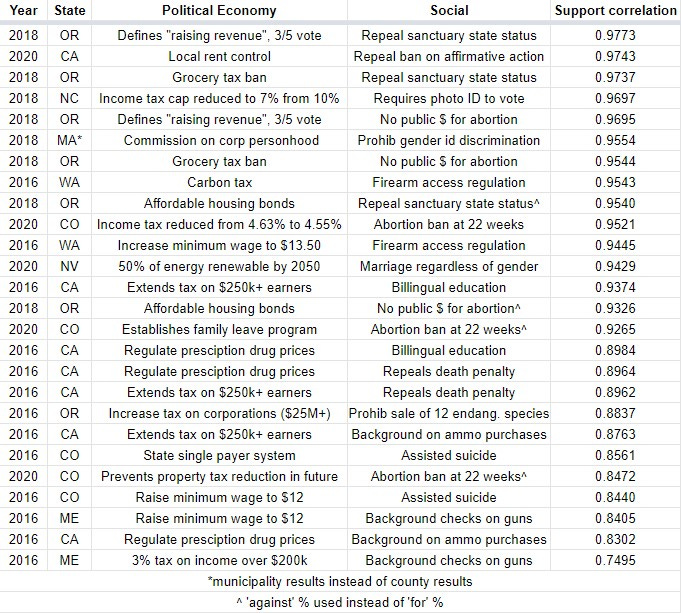Is there a fiscally left, socially right bloc in America?
if you sign on for "right wing social democracy," you better be mainly comfortable with the "right wing" part, bc that's the part we're likely to get
— Sam Adler-Bell (@SamAdlerBell) March 22, 2022
I saw this tweet and wanted to do some research if right-wing social views correlated at all with progressive views on material issues related to wages, healthcare, regulation, taxes, etc. My gut feeling was 'no' but I wanted to do some research and find out for sure.
What I did was look at every instance in the Trump era (defined as 2016-2020) where there was a measure related to the political economy AND a measure that I defined as social or cultural on the same ballot in a state. There are 26 listed in this spreadsheet with a few listed twice as some states had multiple measures related to the economy and/or cultural issues in the same cycle. I've tried to give a brief description of each that conveys accurately what it was intended to accomplish. For the purpose of this exercise, I'm defining political economy as anything related to housing, property/income/corporate/grocery taxation, renewable energy, wages, the regulation of industry, or the welfare state. Cultural or social issues would be defined as anything relating to racial quotas, LGBT protections, animal rights, guns, abortion, language rights, the death penalty, right-to-death, immigration, and voter ID (the last two may be stretches in calling it a social issue but both are definitely "wedge" topics in the U.S.).
I'm pulling these ballot measures from Ballotpedia's list in 2016, 2018, and 2020. The spreadsheet I used to work on this can be found here. I plugged in the county-level results for each of these to find the correlations.

All of these have what you would consider "strong" correlations in support according to Quinnipiac's definition. Some are even close to a perfect 1-to-1 correlation in support.
The conclusion here is that there is little crossover in support for the "left" choice on economic measures and "right" choice on social or cultural measures (and vice versa). The vast majority of people that choose the "left" choice on an economic measure will choose the "left" choice on a social/cultural measure on the same ballot (and vice versa). So, there isn't an appetite for right-wing social democracy in the United States as Adler-Bell seems to imply. That could well change in the future but based on these ballot measures it doesn't exist at the moment.



